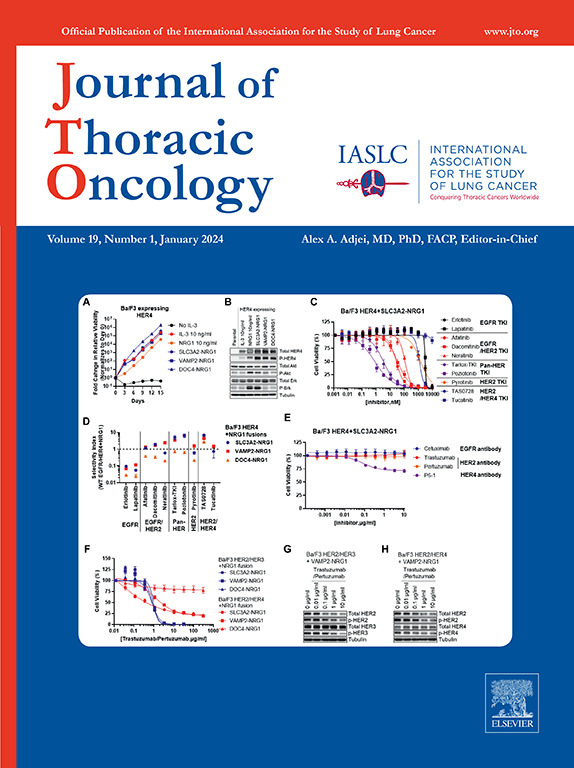靶向治疗联合放疗在无法手术的I-III期非小细胞肺癌(NSCLC)中的新作用:来自国际肺癌研究协会(IASLC)先进放射技术(ART)小组委员会的综述。
IF 20.8
1区 医学
Q1 ONCOLOGY
引用次数: 0
摘要
背景:精准肿瘤学已经改变了非小细胞肺癌(NSCLC)的管理,通过定制治疗驱动肿瘤发生的特定基因改变。靶向治疗,如酪氨酸激酶抑制剂(TKIs),已被证明可以显着提高晚期NSCLC患者的生存率。然而,对于携带驱动突变的早期或局部晚期(I-III) NSCLC患者,当疾病不可切除,或患者因健康状况不佳或合共病而不适合手术时,治疗选择仍然有限。有越来越多的兴趣将靶向治疗与放疗相结合,以优化这一患者群体的治疗结果。值得注意的是,最近有报道称,第三代TKI奥西替尼在放化疗后不能手术、表皮生长因子受体(EGFR)突变的III期NSCLC患者的无进展生存期(PFS)获益。程序:使用PubMed, OVID(EMBASE)和ClinicalTrials.gov对文献进行叙述性回顾,以确定评估靶向治疗和放疗联合治疗无法手术的I-III期NSCLC的研究。主要发现:本综述全面概述了可操作的驱动因素改变的发生率,以及在无法手术的I-III期NSCLC患者中联合靶向治疗与胸部放疗的新临床证据。强调了联合治疗的毒性概况,最佳测序策略,正在进行的临床试验和该领域的未来前景。结论:明确的生物学原理支持靶向治疗与放疗在新辅助、并发和辅助治疗中的协同作用。先进的临床试验方法可以促进这一领域的进一步研究,特别是对于罕见的遗传改变,以改善这些患者的预后。本文章由计算机程序翻译,如有差异,请以英文原文为准。

Emerging Role of Targeted Therapies Combined With Radiotherapy in Inoperable Stages I to III NSCLC: A Review From the IASLC ART Subcommittee
Precision oncology has transformed the management of NSCLC by tailoring treatment to the specific genetic alterations driving oncogenesis. Targeted therapies, such as tyrosine kinase inhibitors, have been found to dramatically improve survival in patients with advanced-stage NSCLC. However, treatment options remain limited for patients with early or locally advanced stage (I–III) NSCLC harboring driver mutations, when the disease is not resectable, or the patient is unsuitable for surgery due to poor fitness or comorbidities. There is growing interest in combining targeted therapies with radiotherapy to optimize treatment outcomes for this patient group. Notably, a progression-free survival benefit has recently been reported with the third-generation tyrosine kinase inhibitor osimertinib in patients with inoperable, EGFR-mutated, stage III NSCLC after chemoradiotherapy.
A narrative review of the literature was performed using PubMed, OVID (EMBASE), and ClinicalTrials.gov to identify studies evaluating the combination of targeted therapies and radiotherapy in inoperable stages I to III NSCLC.
This review provides a comprehensive overview of the incidence of actionable driver alterations and emerging clinical evidence on combining targeted therapies with thoracic radiotherapy in patients with inoperable stages I to III NSCLC. The toxicity profile of combination treatments, optimal sequencing strategies, ongoing clinical trials, and future perspectives in this field are highlighted.
In summary, a clear biological rationale supports the synergistic effects of combining targeted therapies with radiotherapy in the neoadjuvant, concurrent, and adjuvant settings. Advanced clinical trial methodologies may facilitate further research in this area, particularly for rare genetic alterations, to improve outcomes for these patients.
求助全文
通过发布文献求助,成功后即可免费获取论文全文。
去求助
来源期刊

Journal of Thoracic Oncology
医学-呼吸系统
CiteScore
36.00
自引率
3.90%
发文量
1406
审稿时长
13 days
期刊介绍:
Journal of Thoracic Oncology (JTO), the official journal of the International Association for the Study of Lung Cancer,is the primary educational and informational publication for topics relevant to the prevention, detection, diagnosis, and treatment of all thoracic malignancies.The readship includes epidemiologists, medical oncologists, radiation oncologists, thoracic surgeons, pulmonologists, radiologists, pathologists, nuclear medicine physicians, and research scientists with a special interest in thoracic oncology.
 求助内容:
求助内容: 应助结果提醒方式:
应助结果提醒方式:


